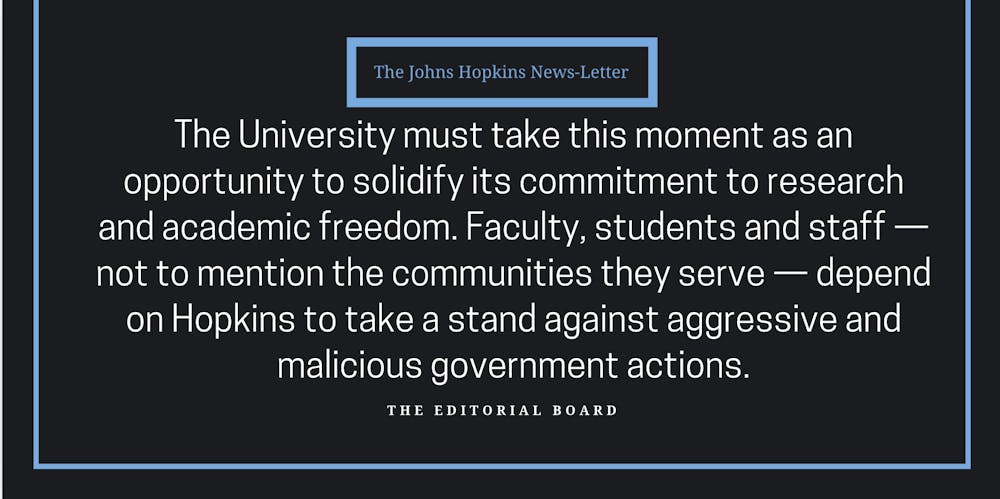Traditionally, our last editorial of the spring semester is spent reminiscing on the past year and encouraging students to look after their mental health during finals. We can’t do that this time. Why? Take a look around.
Hopkins researchers are facing critical cuts to their funding, impeding life-saving work. International students are getting their F-1 visas revoked “without reason or warning.” The U.S. government is imposing increasingly unreasonable demands on universities that target the core academic mission of higher education.
The University must take this moment as an opportunity to solidify its commitment to research and academic freedom. Faculty, students and staff — not to mention the communities they serve — depend on Hopkins to take a stand against aggressive and malicious government actions.
Universities should protect their communities against such unwarranted government interference, as exemplified by Harvard University’s response to the Trump administration. The federal government demanded that the university discontinue all diversity, equity and inclusion programs, be subject to an audit by the government for “viewpoint diversity” and share all hiring data with the government until at least 2028.
In response, Harvard refused to comply, powerfully writing: “‘Neither Harvard nor any other private university can allow itself to be taken over by the federal government. Accordingly, Harvard will not accept the government’s terms as an agreement in principle.’” As a result, the Trump administration froze $2.2 billion in federal grants to the university.
Columbia University, by contrast, caved to the Trump administration after it lost $400 million in federal funds, placing its own Middle Eastern, South Asian and African Studies Department under oversight and creating a new security force that can arrest and remove people from campus. Despite meeting the administration’s initial demands, Columbia is not safe from further cuts; the University just lost another $250 million in federal funding from the National Institutes of Health.
Columbia’s concessions have irrevocably altered its institutional integrity and commitment to academic freedom. Perhaps they will have their funding reinstated, but, even then, what will be left of Columbia? The university will be little more than a shell of its former self, whose students no longer have faith in being protected.
Hopkins and other private universities must not follow Columbia’s example. Should the Trump administration turn to us with a list of similar demands, we hope we can count on Hopkins to protect its values, its programs and, most importantly, the people that have made our University what it is today.
Even before demands are handed down, Hopkins and all universities must take steps to band together in defense of higher education and academic values. The Big Ten Universities recently formed a Mutual Defense Compact to defend academic freedom and research.
On April 22, the American Association of Colleges and Universities (AACU) published a powerful statement opposing the Trump administration’s “unprecedented government overreach and political interference.” Over 180 University presidents signed on, including the Presidents of Duke, Harvard, Cornell, University of Pennsylvania, the University of Maryland, and Princeton.
Despite being a member of the AACU, Hopkins did not sign onto the letter. At these critical moments when higher education is under attack, Hopkins must join other institutions in opposing the Trump administration — not stay silent and hope to fly under the radar.





